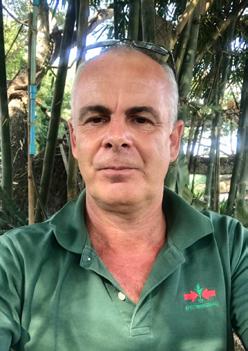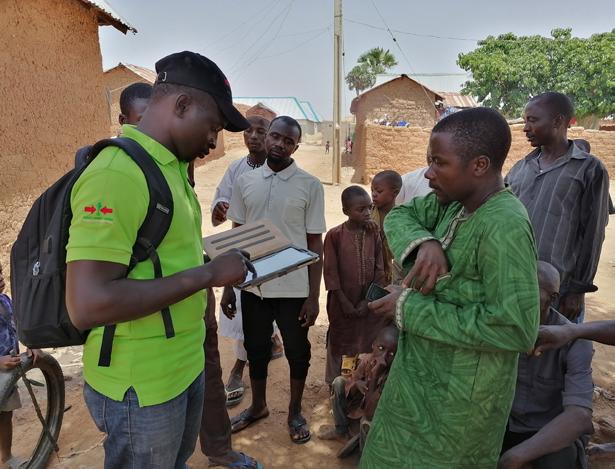
14 minute read
Farmer stories
“I am very happy to learn the new technologies that were introduced to me by East-West Seed KT,”
“I am also grateful to the staff for helping me to improve my vegetable cultivation practices and livelihood.”
Advertisement
India
Sabita Sahu is a vegetable farmer in the village of Lolasingi, located in the Indian state of Odisha. She grows a variety of crops, including tomato, chili, maize, bitter gourd and beans. In the past, she oftentimes faced problems due to a lack of cultivation knowledge and a high cost of production.
Then East-West Seed KT staff contacted her, and she agreed to grow a bitter gourd demo on 195 sqm of land. EWS-KT introduced new and innovative techniques to both her and her neighbors. As a result of EWS-KT’s guidance, her next crop was more profitable than what she would have obtained through traditional growing practices.
With her profit she was then able to invest in additional materials to improve her plot of farmland. She now cultivates vegetables on over 8,000 sqm of land. She says she is confident to grow more crops by using practices she learned from the KT team, and she is also actively sharing her knowledge with other villagers.
Myanmar
Nang Khin Ni Aung is a schoolteacher who lives with her extended family in the village of Shan Su in Hpa An township, Myanmar. For many years Nang had been growing yard long beans and cucumbers in her backyard farm for family consumption. If there was ever a surplus, Nang would sell the crops at the local market. Along with her husband, who is also a schoolteacher, the two worked in the vegetable garden before and after school, and during the holidays.
Although they had farmed vegetables for many years, their yields and profits were always low. Their family’s situation was only exacerbated by their low salaries as teachers. One day Nang met Saya Saw Hel Htoo from the local East-West Seed Knowledge Transfer team and from then on, the lives of her and her family members changed for the better. From the KT team, she received training about land preparation and plant and disease management.
She also visited other farmers to learn how they had implemented the practices supported by EWS-KT. When she applied her newly acquired knowledge to improve her vegetable production, she was met with great results.
She then became a lead key farmer to share her knowledge with other farmers in the community, and provided demonstrations to give the participants first-hand experience. Now, the techniques Nang learned from the EWS-KT team are used throughout her local community. As her vegetable production became considerably more profitable, Nang and her husband decided to hire two local workers to assist in the farming, thereby helping to create jobs in the community. The crops are currently in the harvesting stage, and thus far her surplus vegetables have earned her family 810,000 MMK (US$580) from cucumber and 600,000 MMK (US$430) from yard long beans. Through her improved income from the higher yields, she intends to support her parents sufficiently and also donate more money to the local charitable causes. Nang continues to keep in contact with Saw Hel Htoo for further advice and technical assistance.
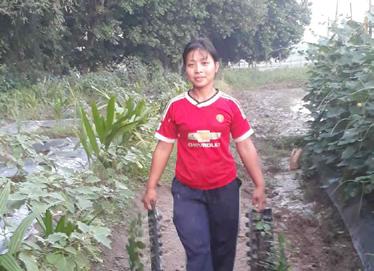
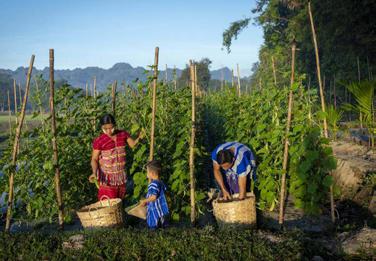
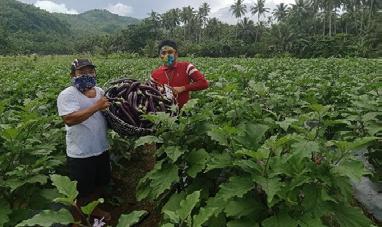


The Philippines
Edwin Bernaniza lives near the municipality of Mahaplag in the province of Leyte, Philippines. The father of four was a van driver, and while he had previously harbored interest in vegetable production, his time was limited due to his demanding job.
In March 2020, at the height of the COVID-19 pandemic, van operators were forced to temporarily cease their operations due to health protocols enacted by the government. This left Edwin unemployed, but it also provided him with an opportunity to pursue his interest in farming while staying at home with his family.
Edwin was able to receive training and support through the Philippines Good Agricultural Practices program via a joint partnership by the Australian Centre for International Agricultural Research and the EWS- KT team. He now has his own vegetable farm filled with different varieties of crops, his most profitable being EW Seed’s Morena F1 eggplant variety, which now has a total yield of 500 kg while still on its third harvest.
Edwin says that, thanks to the training and support, being a vegetable farmer has given him the chance to live a more fulfilling life while also being able to spend more time with his family.
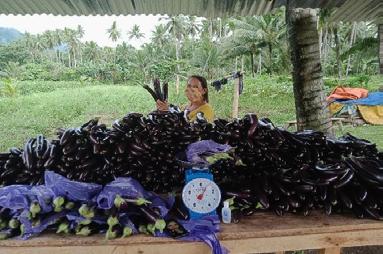

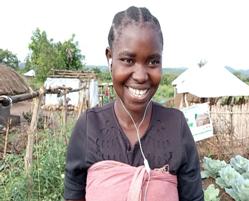
“My husband and I are glad that our lives are changing slowly as we continue with our daily farming activities,” she said.
“We are glad we now have the knowledge of vegetable production. Hopefully when our country stabilises, we will engage in commercial production back home and train our neighbors to do the same.”
Uganda
Edna Asante is a 22-year-old refugee from South Sudan, Yeyi State. Along with her three children, Edna and her family fled their homeland in March 2018 due to a civil war and are currently living in the Rhino Camp Extension Refugee Settlement in northwestern Uganda.
Upon arriving in Uganda, Edna was allocated a small plot of land – about 250 square meters – on which they constructed a shelter and prepared a small patch of farmland. While Edna and her family were safe from the horrors of the war, their new life in Uganda was also proving difficult. The plot of land Edna was given was rocky, which made it challenging to grow vegetables successfully. Despite having land for farming, her family mostly subsisted on rations of maize grains and beans given to them by the World Food Programme.
Her luck changed in early 2019, when her community took part in a training session held by East West Seed Knowledge Transfer as part of Wageningen University & Research’s Nutrition and Income Generation Intervention (NIGI) project. The community members received training about kitchen gardening, including how to successfully farm in rocky soil.
The program had an immense impact on the lives of Edna and her family. Using the knowledge gained from the NIGI program, she was now able to produce more than enough vegetables for their family, meaning they could sell the surplus to buy household necessities such as soap, sugar, and salt.
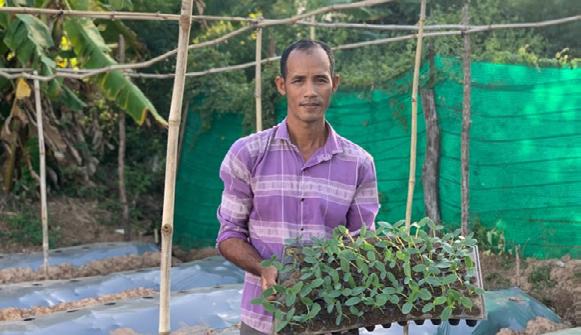
Cambodia
Poa Sophea is a Cambodian who lives in Kratie, a village in the northeastern part of the country near the Mekong river. The region is heavily dependent on agriculture, fishery and forestry. In the past, Poa made a meager living by cutting wood from a forest near his home and selling it to local villagers. He had tried his hand at farming as well, but with little success.
In March 2020 Poa began participating in the Cambodia Horticulture Advancing Income and Nutrition (CHAIN), a project operated jointly by the Netherlands Development Organisation (SNV) and EWS-KT that strives to improve vegetable production for smallholder farmers.
He began using his newly-acquired farming skills by growing cucumbers on a 1,000 sqm plot of land. This unfortunately coincided with the beginning of the Covid pandemic, which hampered his initial efforts. However, he was undeterred and stayed active with the local group and project coordinators via phone, Facebook Messenger, and direct meetings held with the usual safety precautions. Through proper guidance and his own determination, he eventually earned a profit of around US$500 from the sale of his crops at harvest. From the initial success, Poa is continuing to acquire knowledge about the benefits of land preparation, nutrient management, water resourcing and plant spacing.
He has doubled the amount of land for cucumber farming, and is preparing to plant corn and eggplant as part of a plan for crop rotation. He has also begun keeping detailed records, a method introduced to him through the program, as a way to track profits and costs, improve his technique, and plan for the future.
Other villagers have taken notice. Poa is now regularly visited by neighbors in the area who wish to learn his techniques and adapt their farming methods, meaning that the he is not only helping to improve himself and his family but also the community as a whole.
Tanzania
Nemati Misasi is a 45-year-old tomato farmer who lives in a small village in the Kamaha district of the Sinyanga region of Tanzania. Farming his land was always physically demanding, however, because in order to irrigate his small plot he had to fetch water from a deep well using just a rope and a bucket. Due to this, Nemati had a deep desire to purchase a pump to make his farming easier and more efficient.
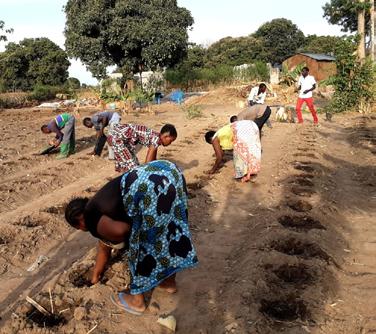
He began working with the local EWS-KT team after attending a demo provided by a local tomato farmer. He agreed to test out a demo plot on his farm using the EWS growing and production methods, in the hopes that he could use the higher profits to acquire a water pump.
Nemati followed the advice of the KT team, including using Imara F1 tomato variety seeds and employing proper practices of raising seedlings, transplanting, crop management, fertilizer application, integrated pest management, trellising and mulching.
At harvest time, following the advice from the KT team paid off, as the tomato crop exceeded his expectations. Nemati was proud of the yield and he became the envy of the Sangilwa village. He could now use the profits to finally purchase the water pump he so desired. In fact, he was even able to use some of the excess profits to install a small satellite TV dish on his home.

“I am very happy after accomplishing my wish and even more,” Nemati said. “I am very thankful to EWS-KT for the technical support and I promise to increase the scale of production and make full use of my new irrigation pump.”
Transplanting Nemati’s tomato plot with neighbouring farmers
EWS-KT TFO, Christopher Mganga proud of his support to Nemati.
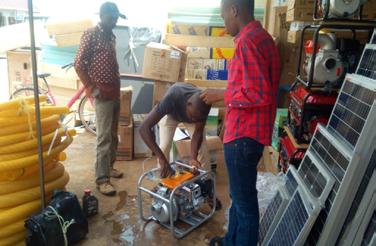
Nigeria
Gidan Kwari village is a rural community in the Bunkure Local Government Area of Kano State in Nigeria. Like most communities in rural northern Nigeria, its inhabitants are largely dependent on agriculture for their livelihoods. Unfortunately farmers here face many challenges, including unpredictable rainfall as well as lack of technical knowledge of the latest agricultural practices.
Bashir Abdu Sani is a 33-year-old farmer in Gidan Kwari who also runs a small pharmacy in his neighbourhood. He has a 250 sqm piece of land where he has been cultivating tomatoes for many years, but without much success.
In 2020, Yusuf Magaji Dabai, a Technical Field Officer for the local EWS-KT team, visited Gidan Kwari to train some farmers on the safe use of pesticides. During the trip he met Bashir on his farm and noticed signs of some pests and diseases on the tomato crops, and successfully convinced Bashir that his output could be improved by employing new growing methods. Bashir was initially skeptical because his crops had always grown so poorly in the past, but eventually he agreed to the plan and the two began the transformation.
First, Bashir established a demonstration on his plot of land and planted platinum F1 variety tomato seeds. Yusuf trained Bashir extensively in the best practices of land preparation, sowing the seeds, raising and transplanting the seedlings, and most importantly, pest and disease management. When it was time to trellis, Yusuf taught Bashir step-by-step until he was able to tie the strings by himself. Other EWS-KT practices he taught him included the use of organic mulch and the correct pesticide application. As the tomatoes grew, Bashir was astonished at the results. When it came time to harvest, Bashir’s yield and subsequent profits far exceeded his expectations, with a net gain of about 255,000 Nigerian naria (US$669). With the proceeds from the bumper crop, Bashir was able to purchase a number of items that would improve his life and his future farming practices, including a used motorbike, a water pump, a cellphone, fertilizer and insecticides. Bashir has since become the talk of town and he regularly receives visitors from
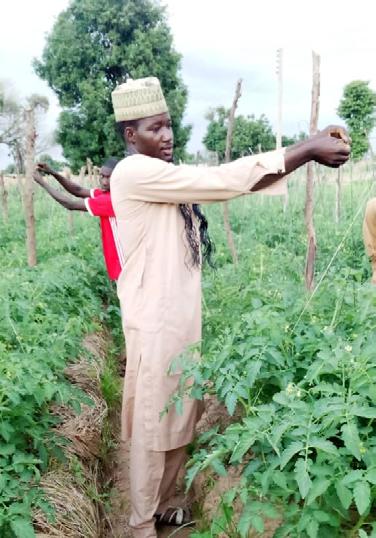
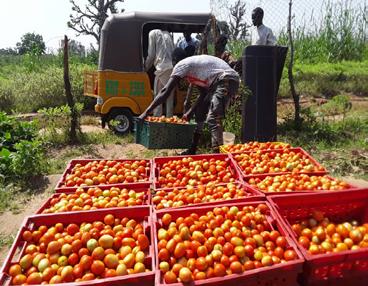
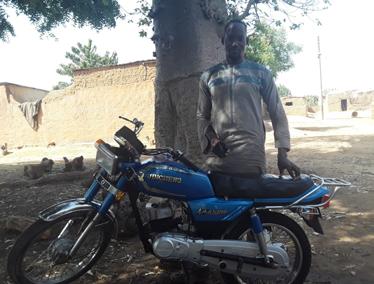
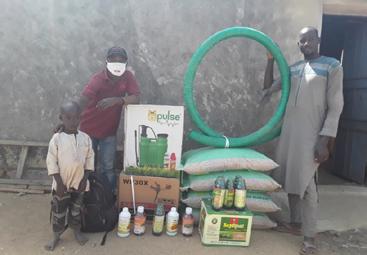

his village who enquire about the EWS-KT techniques. The realisation of the potential inherent in EWS-KT’s improved agronomic
practices has motivated both Bashir and the entire Gidan Kwari community to acquire seeds and farming equipment in readiness for the upcoming rainy season.
“To be candid, nobody in this community would ever believe tomatoes would do so well in the dry season because of the Tuta absoluta pest,” he said.
“But EWS-KT techniques and Platinum f1 seeds proved us wrong.”
Indonesia
Youth engagement in vegetable farming
In 2020, the Yayasan Bina Tani Sejahtera (YBTS) Foundation assisted 2,602 young farmers through a series of trainings on good agricultural practices and field days at crop demo sites. YBTS Technical Field Officers were also active in providing assistance to help the young participants become successful vegetable farmers. Here are a few brief stories about the youth farmers in Indonesia who took part in our program.
Learn and practice together
Through the program, we encouraged young farmers to work together as a group in establishing vegetable demonstration plots. This way they could learn together, share knowledge, support one another, and increase their chances for success. A group of 25 young farmers living in the Cendana municipality of the Timor Tengah Selatan district showed what working together can achieve. The participants, who ranged in ages from 19 to 29, adopted the YBTS team’s strategies on sustainably maximising crop production. They were able to grow 1,600 tomato crops and harvest 1,675 kg of fresh tomatoes, an average of more than 1 kg per plant. While many in the group are employed around town in various occupations such as motorcycle taxi drivers, shopkeepers and honorarium teachers, the positive results of their venture showed them that vegetable farming can be a promising source of additional income. They all expressed gratitude to YBTS Project Officer Hermina Supadi for her support and guidance throughout the project.
Never give up, despite challenges & difficulties
Bang Ari is a 29-year-old vegetable farmer who lives in Cerucuk village, Belitung Regency, a scenic island southeast of Sumatra. Before becoming a farmer, Bang worked as a fisherman and sometimes as a laborer on a vegetable trader’s farm in his village. One day YBTS technical field officer Andre Ferinando encouraged him to try farming on his own. His first attempt at growing sweet corn was a bit of a disappointment as he harvested only about 30% of the potential yield. This was partly due to the highly acidic soil present in the Belitung area. Undeterred, Bang tried again by planting 2,000 cauliflower seeds, and incorporating advice received from the EWS-KT and YBTS team. This time, the results were far better. He also took pride in how his farming is helping to uplift the community.
Nursery project is fun
Due to the COVID-19 pandemic, YBTS TFO Rika Bhernike launched an initiative on Morotai, an island in North Maluku, that encouraged young locals to grow the vegetables in their yard because they were forced to stay at home. In the first months, 20 young participants joined the “Nursery Project” by planting chili and eggplant. The youths say they are enjoying their new hobby, and program leaders are looking to increase enrolment in the coming year.
Why should one go to the city? Farming in the village is profitable
Selfina Bere (Isa) is another success story for EWS-KT and YBTS team. She is a 20-year-old who lives in the Mollo Utara area of West Timor province. She was originally a shopkeeper, a job she began after graduating high school. In 2019, she joined the Manektob farmer group operated by EWS-KT and YBTS upon encouragement by her mother, who was also a member, and was guided by program coordinator Junike Medah. Taking part in the program allowed Selfina to obtain knowledge about seed selection, nurseries, fertilizers and crop management. After just the first tomato harvest, Selfina was able to make IDR 4 million (US$400) in profit. Seeing the potential of vegetable farming, she planted other types of crops. Eventually,
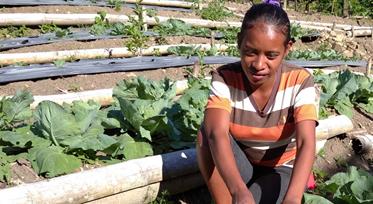
she was making up to four times more selling vegetables than she was when she worked as a shopkeeper. Thus she has now decided to devote her full efforts to farming. With the increased income and ability to spend more time with her parents and family, Selfina said she has no desire to leave the countryside to work in a city again.


